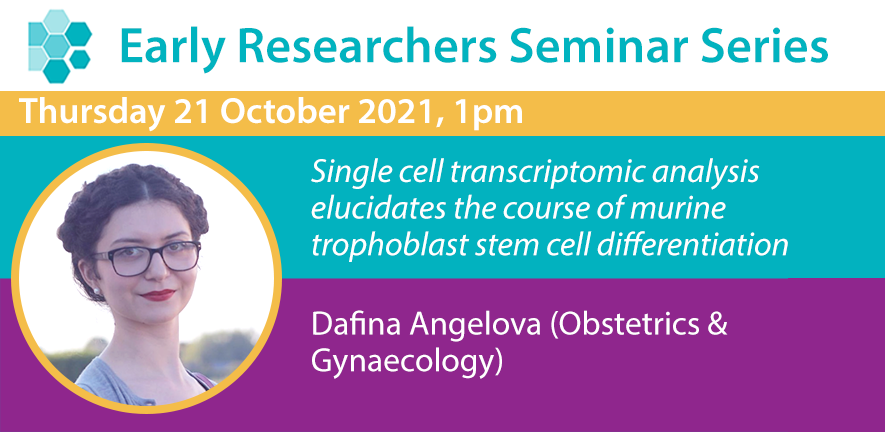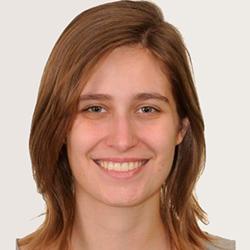
Thursday 21 October 2021, 1pm - 2pm
Introduction to this year's Early Researchers Seminar Series
Dafni Lima (Law)
Single cell transcriptomic analysis elucidates the course of murine trophoblast stem cell differentiation
Dr Dafina Angelova (Obstetrics & Gynaecology)
Chair: Dafni Lima (Law)
This seminar will take place online; to receive the Zoom meeting details for this year's series, please email Christina Rozeik (coordinator@repro.cam.ac.uk).
Speakers and abstracts
Dafni Lima is one of the Coordinators for the Early Researchers Seminar Series and a member of the Cambridge Reproduction SRI Steering Committee. She holds a PhD in Criminal Law from the Aristotle University and is currently doing a PhD in Family Law at the University of Cambridge. Her research interests in family law include parenthood, assisted reproduction, regulation of marital and non-marital relationships, as well as same-sex couples and LGBT+ parenting.
Single cell transcriptomic analysis elucidates the course of murine trophoblast stem cell differentiation
Dr Dafina Angelova (Obstetrics & Gynaecology)
Murine trophoblast stem cells (mTSCs) are an important in-vitro model for the study of self-renewal and differentiation in the trophoblast compartment. The pathways that drive the establishment of trophoblast lineages are not fully understood. We hypothesized that early mTSC differentiation is characterised by transitional states defined by transcriptomic changes. Differentiation of the TS-EGFP TSC cell line over a time-course of 0-48h was induced by two methods – MEK inhibition using a selective inhibitor and withdrawal of conditioned medium (activin and FGF4). Transcriptomic libraries of 136,291 differentiating mTSCs were generated using Drop-Seq with an average of 1740 reads and 1059 genes per cell. Cluster analysis indicated that the two methods of mTSC differentiation resulted in distinct cell populations over time with differences from T0 being more pronounced in the later time points. Two early mTSC differentiation trajectories were identified in pseudotime – labyrinth progenitor (LP) cells and ectoplacental cone (EPC) cells. Gene expression modules for these trajectories contained previously identified and novel markers and TF regulons for LP and EPC. Comparing the two differentiation methods demonstrated that MEK inhibition resulted in accelerated differentiation with a higher proportion of LP cells. Our analysis demonstrates that early mTSC differentiation is characterised by profound transcriptomic changes and resolvable trajectories preceding the expression of canonical trophoblast markers.
About Dafina Angelova: I am a postdoc at the Department of Obstetrics and Gynaecology where I started in 2019 after completing my PhD. I am a member of the Charnock-Jones lab and my research focuses on applying single cell transcriptomics to the characterisation of the placenta as well at trophoblast cells in-vitro. I’m currently developing a novel microfluidics-based single cell sequencing technology in collaboration with Nanjing Tech University and Sphere Fluidics. This will be applied to characterise the heterogeneity and complex interplay between different placental cell types which can help uncover their role in both development and differentiation and pathology.
The Early Researchers Seminar Series (ERSS) is a platform for PhD Students and early career researchers (ECRs) at the University of Cambridge with research foci on reproduction to share and discuss their research with other academics from a range of disciplines also researching reproduction at the University. Seminars are held on Zoom on the third Thursday of every month, 1pm - 2pm. For the full 2021 - 2022 programme, please see this year's seminar page.



